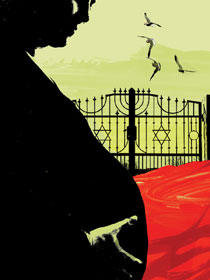Issue Archive
Family Matters: Pregnant on the Pulpit

Rabbis often attend a bris and a funeral on the same day. For a rabbi who is expecting, witnessing the full range of the cycle of life has added poignancy.
This morning I sat in a hospice room, held hands with a woman who is dying and adjusted my pregnant belly over my knees. It felt both wrong and wonderful to bring such an obvious sign of life into a place where the angel of death hovers at the lintel of each room.
As I sat there, listening to her talk of her family, of her anxiety about death and of her concern for her husband, I rested my hand on my belly. For the past several weeks I have been waiting to feel the first signs of movement from this baby. That quickening should be coming at any time, and it seemed that the perfect moment would be while visiting this woman: one life felt for the first time, the other for the last.
Never have i been more conscious of the tenuous line between life and death. As a pulpit rabbi, there have always been days when I officiate at both a wedding and a divorce, at a baby naming and a funeral. Rabbis are blessed to be able to see the cycles of life in a microcosm. We have black suits that go from a funeral to a wedding and back to the house of mourning. In one day we bear witness to the love that brings two people together, the resentment and disdain that drives them apart, the joy that new life brings to a whole extended family and the gaping hole left by the loss of a life.
But even after several years of seeing this firsthand, pregnancy has brought the message home in a new way. There is an impulse within Jewish tradition and Jewish law to keep life and death separate. Take the laws of kashrut, where we are commanded to avoid the blood of an animal because the soul is in it; or the laws of family purity, which tells us to avoid intimacy in the days that follow menstruation because it symbolizes the loss of potential life. So what happens when the intersection between life and death is unavoidable?
A few years ago, a congregant called to ask me if her pregnant daughter could accompany her to the cemetery to look at burial plots for her husband. She had heard that pregnant women were not allowed to visit the cemetery lest they invite the evil eye upon themselves. I gently explained the difference between custom and law and suggested that she discuss it with her daughter. She challenged me, asking, “But Rabbi, can you guarantee that if my daughter comes to the cemetery, nothing bad will happen to the baby?” Again, I gently explained that I was not in the guarantee business and was sure that she would make the right, though difficult, decision for her family. Sometimes it is easier when the halakha can guide us on our path.
Unveilings and funerals are part of my rabbinate, so I have no choice about entering the cemetery while pregnant. I have been going to the cemetery since almost the day I found out I was expecting. While the first time felt odd, after that my biggest concern was making sure the bathroom was left unlocked for me. Now that my pregnancy is obvious, my congregation, which has never previously been served by a woman, is coming to terms with what, if anything, it means for them and their life-cycle moments.
This afternoon, as i walked back to my car following a burial, the wife of the deceased approached me with one last question before she left the cemetery. “Does your mother know you are here?” she asked, “because my mother would never have allowed me into the cemetery while I was pregnant.” I smiled and told her that my mother knows and (mostly) no longer tells me where to go and what to do, but that my grandmother has no idea.
If it seems like there is a lot of death and dying in the rabbinate, there is. Like many rabbis, I officiate at far more funerals and unveilings than I do weddings and baby namings. It is rewarding to be with people, to guide them through our tradition in the most painful of times. But I cannot help but wonder if my obvious belly brings comfort or despair to people at a time when it should not be about me at all.
The woman in the hospice room died two days after my visit; she was surrounded by family and friends. When I cried while officiating at her funeral, some blamed it on pregnancy hormones. In truth, though like most pregnant women I am more emotional than I would like to be, I cried simply for the loss of a person who was beautiful and courageous and touched me in both her life and death.
We all live with the constant reality of the words of Ecclesiastes—there is “et laledet ve-et lamut” (a time for giving birth and a time to die). However, to live for nine months between these two times has been one of the unexpected challenges and privileges of my rabbinate.
Deborah Wechsler serves as a rabbi at Chizuk Amuno Congregation in Baltimore, Maryland.









 Facebook
Facebook Instagram
Instagram Twitter
Twitter
Leave a Reply